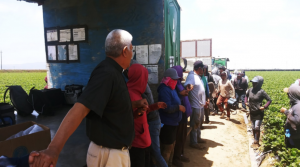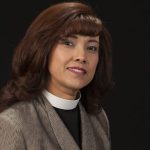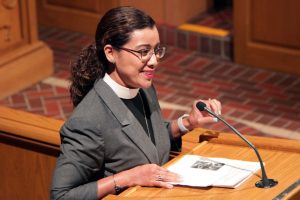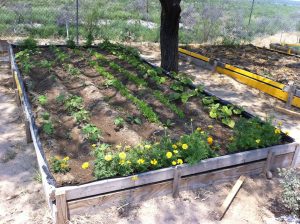The faith community of Iglesia Luterana Santa Cruz communes with Christ in a strawberry field of Santa Maria, Calif. It’s but one expression of a ministry of hospitality and hope with working-poor immigrants.
Founded in 2002, this new-start community has grown and expanded its reach over the years to the larger community of working-poor immigrants who face many obstacles daily in simply living their lives. This includes coordinating the weekly lunch program with Latinx workers in the field.
The average week for the husband-and-wife team of Pastor Esteban and Angie Salazar includes leading worship with a growing community, buying fresh ingredients to make homemade tortas, managing volunteers to coordinate Santa Cruz’s food pantry and so much more.

Immigrant farmworkers join in prayer with Pastor Esteban and Angie Salazar in a strawberry field.
Immigrant farmworker ministry
In 2017, Esteban and Angie felt a strong call to help their congregation’s immigrant farmworkers who labor in a nearby strawberry field. After communicating with the warden of the field, who thought Esteban and Angie were pulling a prank, they drove to the field and were greeted with a “really, you’re here?” surprised response from the warden. Now they make weekly visits, as supplies and resources are available.
On a typical Thursday morning they will shop for fresh-baked bread and other ingredients to prepare tortas. Depending on the day, they will make anywhere from 60 to 200 tortas to serve to the strawberry-field workers. Additionally, they will spend time reading scripture, singing and praying with the workers. Esteban’s belief is, “You have the ‘gospel’ and you have ‘feed my people’…you have to do both.” Creating the space to share a meal and worship right there in the field gives “loving your neighbor” a renewed outlook.
Building the church community
The immigration crisis in the United States has a direct impact on this church community. US Immigration and Customs Enforcement has come in and separated multiple families in the congregation; many cannot seek medical assistance because of the high cost; and single-parent homes fight the battle between work and family care. These tough conditions can make hope for a miracle seem absent. Angie has strong feelings about these tough circumstances: “We have a responsibility to do what Jesus would do and Jesus wouldn’t leave them there with nothing.”
The community at Iglesia Luterana Santa Cruz comes together in several activities to help congregants and the larger community. One ministry initiative at Christmas is the Angel Tree Project, a gift-giving program that provides presents for local children. In 2016, a total of 75 students received gifts through the Angel Tree. Last Christmas, the number rose to 400. Additionally, sister churches have begun providing food-pantry items, clothing and monetary help to specific individuals.
The congregation needs more help to care for its immigrant community, including a shed to be built for the influx of pantry items and additional medical support for families. However, Santa Cruz continues to live out a passion for Jesus and reliance on the Holy Spirit.
by Blake Thomas, Congregational Vitality Team
edited by Kris A. Mainellis, Program Director for Communication and Events, Congregational Vitality

 Irma Banales has walked an interesting path to become a pastor in the Evangelical Lutheran Church in America. She currently serves as director for evangelical mission for the Northern Texas – Northern Louisiana Synod. But her journey began in Mexico.
Irma Banales has walked an interesting path to become a pastor in the Evangelical Lutheran Church in America. She currently serves as director for evangelical mission for the Northern Texas – Northern Louisiana Synod. But her journey began in Mexico.

